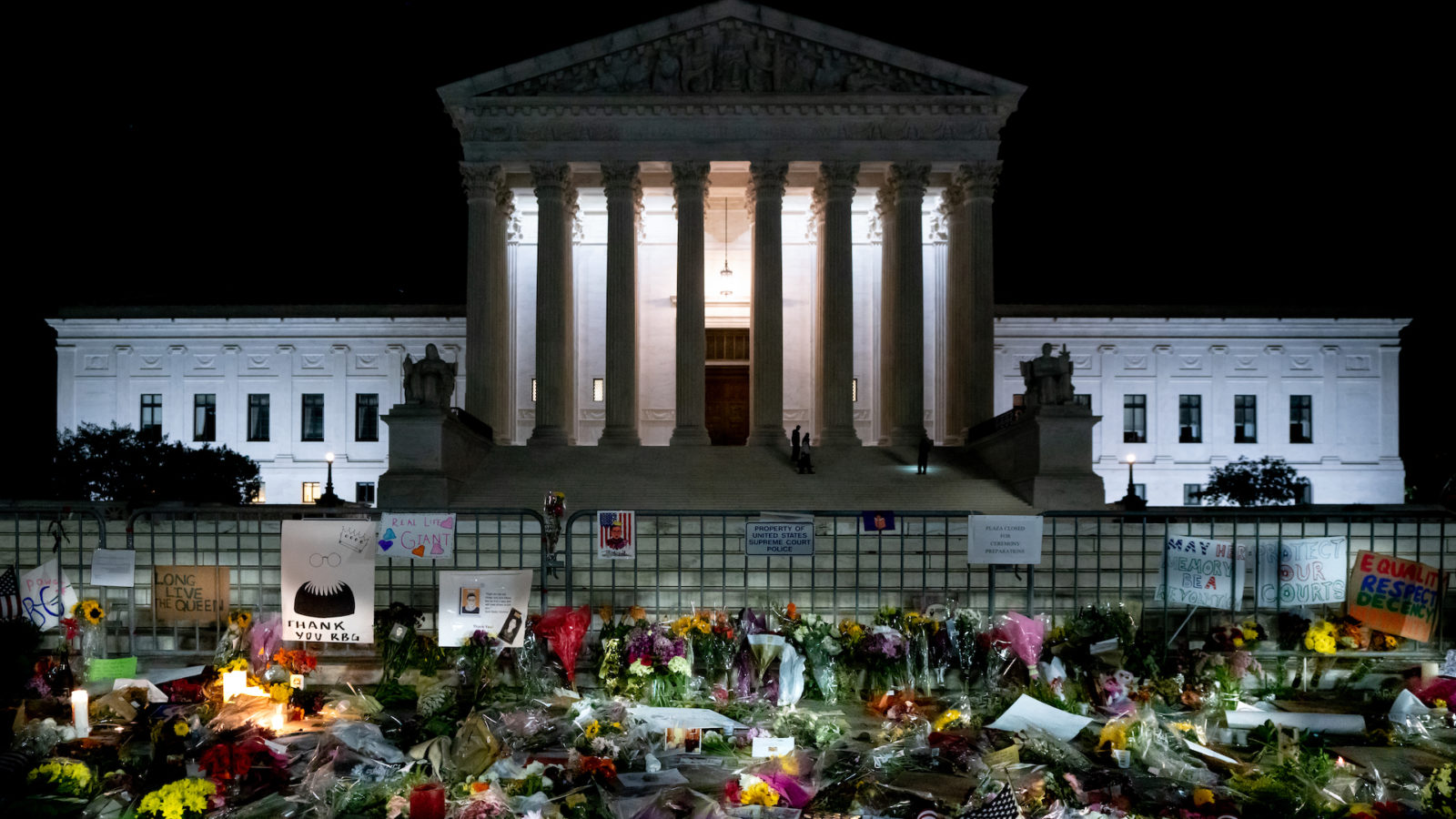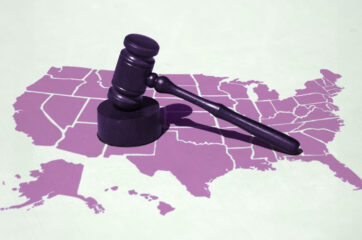Losing a cultural and legal icon always has dramatic consequences, but in this political moment, Justice Ruth Bader Ginsburg’s death could have dire implications for the future of legal protections and action on climate.
Although primarily revered for her advancement of gender equality and her sharp-tongued dissents, Ginsburg was also a reliable environmental vote on the Court through opinions and dissents. In the Solid Waste Agency of Northern Cook County v. Army Corps of Engineers (2001), Ginsburg joined the dissent arguing for a more expanded jurisdiction for the Clean Water Act. Also notably, she joined the majority opinion in Massachusetts v. EPA (2007), a landmark climate decision detailed later in this piece.
However, her environmental record was not always rosy, as seen in her vote to approve a pipeline running underneath the Appalachian Trail, a move seen by environmentalists as one that threatens the protections for national parks.
Despite her nuanced past with environmental rulings, the vacancy left on the Court by Ginsburg’s death leaves President Trump with the ability to fill his third Supreme Court seat in his first term, cementing the conservative fate of the Court for decades to come.
Where does Judge Barrett stand on environmental issues?
President Trump’s nominee, Judge Amy Coney Barrett, is a staunch conservative and has been described as the “heir” of the conservative idol, Justice Antonin Scalia. She is a product of the same system that molded the careers of Justice Neil Gorsuch and Justice Brett Kavanaugh (President Trump’s previous two appointees), the Federalist Society, known as the most influential legal organization in American history. An unnamed professor at her alma mater, Notre Dame, even went so far as to say she was groomed for this movement.
Barrett is an originalist and a textualist, which essentially means that she curates her opinion based on the original intent of the authors of a law and the specific words they included in the text of the law. This leads to a very narrow interpretation, which historically has not lent itself to supporting climate action, due to the fact that climate change is a recent phenomenon not known at the time to the Framers of the Constitution.
Although her record on environmental and climate cases has not been definitively exhibited thus far, her opinions on standing in past public interest cases are cause for concern. In two recent cases —Casillas v. Madison Ave. Assoc. and Protect Our Parks, Inc. v. Chicago Park District— Barrett rejected the plaintiff’s standing to redress their injuries. In Casillas, she held that the consumer lacked standing to challenge a debt collector’s failure to adhere to the Fair Debt Collection Practices Act. In Protect Our Parks, she dismissed the case of citizens in Chicago arguing that private development in Jackson Park violated the public trust doctrine in Illinois. This calls into her question on permitting environmental and public health lawsuits to move forward on the Supreme Court.
Furthermore, during Barrett’s confirmation hearings this week, Senator Kamala Harris pressed her on whether “climate change is happening and it’s threatening the air we breathe and the water we drink.” Barrett responded that she would not “solicit an opinion” on a “matter of public policy, especially one that is politically controversial.” It is very concerning that a potential Supreme Court justice would not explicitly acknowledge the existence of climate change and the harm it will wreak on our lives and wellbeing.
According to Dan Urman, professor of constitutional law and the modern Supreme Court at Northeastern University, the most pressing issue for climate in the courts is one that lies beneath the fanfare and has not been used since the 1930s, the nondelegation doctrine.
Reviving this doctrine would limit the ability of federal agencies like the Environmental Protection Agency to act boldly to regulate the environment and act on climate change. Urman continued to say, “So essentially that’s the argument that is brewing in the background. The larger point is that there are arguments by conservative judges that agencies themselves violate the ‘All legislative Powers herein clause.’”
It is unclear whether or not Barrett is in support of reviving this doctrine; however, with a 6-3 conservative majority, its resurgence is certainly on the table.
Implications for climate action
Climate advocates are also worried about Massachusetts v. EPA (2007), the Supreme Court case that established greenhouse gases as pollutants under the Clean Air Act. This case also granted the ability for states to sue the federal government for its failure to act on climate change. As the courts become a more and more popular place to tackle climate change and hold polluters accountable, any dismantling of this opinion would have severe consequences going forward.
With Barrett’s tendency towards narrow interpretations of statutes, it brings the survival of this critical decision into question. Just look at her mentor’s, Justice Scalia, dissent in the case. He claimed that the science of climate change was still too uncertain for the EPA to begin regulating greenhouse gases as an air pollutant. Combined with Barrett’s responses at her confirmation hearings, it is not difficult to extrapolate how she would rule if she were sitting on the bench for this case.
Vice President Biden currently has the most ambitious climate plan of any presidential nominee in history. His Build Back Better Plan invests $2 trillion in clean energy projects. If Biden is elected and follows through with these plans, it is almost certain that there will be court challenges. These policies rely on creative and expanded powers of agencies that conflict with the textualist and originalist jurisprudence that reign supreme on the Court, particularly with the addition of Barrett.
Professor Urman, however, warned of the consequences of a Supreme Court that ruled against the wishes of the majority of the American public. “I think that if the Supreme Court strikes down overwhelmingly popular statutes and regulations including abortion, healthcare, and the environment, you’re going to see the grounds of court reform,” he said.
Calls for court reform or court “packing,” once a fringe idea from progressives, have made their way back into headlines as the American public grapples with the idea of having a conservative supermajority on the Court. Most commonly associated with President Franklin Roosevelt, Democrats argue that expanding the court by adding more justices will balance its representation. Senate Minority Leader Chuck Schumer told his caucus, “Let me be clear: If Leader McConnell and Senate Republicans move forward with this [Barrett’s confirmation], then nothing is off the table for next year. Nothing is off the table.”
So what can we do? Professor Urman emphasized that, “Elections have consequences at every level of government. Vote, vote, vote, vote.” It’s critical that we mobilize environmentalists to vote in every election, and this one most importantly. We know that the world is on a ticking clock to address climate change, and we have already waited too long.
Join Climate XChange every Tuesday and Friday until the election from 3-4pm for a Get Out the Vote Power Hour. The stakes are too high to sit this one out.









